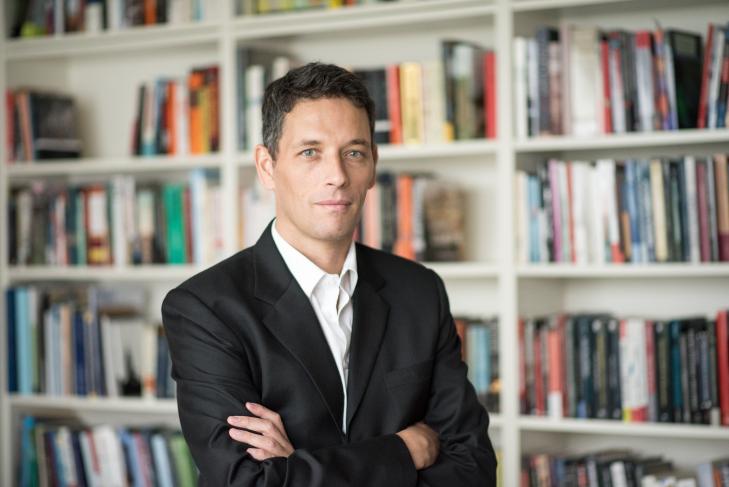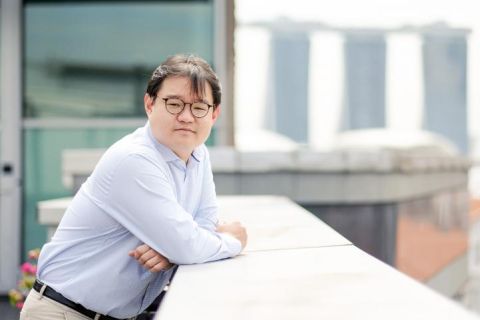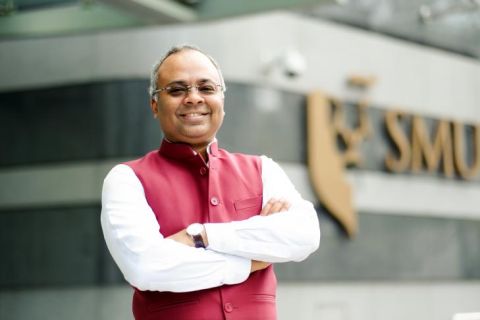
SMU Assistant Professor Eduard Jordaan studies the forces and influences that sway a country’s behaviour on international platforms like the United Nations.

Photo Credit: Cyril Ng
By Grace Chua
SMU Office of Research – In the 1990s, South Africa overturned apartheid laws after decades of protest and conflict, and set up a Truth and Reconciliation Commission to probe violence and restore justice. In 1996, it became Africa’s first country to constitutionally outlaw discrimination on the basis of sexual orientation. Several of its policies are built on a liberal human rights foundation.
And yet on the world stage, when push comes to shove, South Africa has defended countries that suppress human rights on their home turf. For the past four years, the work of Eduard Jordaan, Assistant Professor of the Singapore Management University (SMU) School of Social Sciences, has centred on this phenomenon.
Defending problematic regimes
The South African professor of political science, who has been at SMU since 2007, became fascinated by anecdotes of South Africa’s actions at the United Nations (UN) Human Rights Council in Geneva, a subset of the UN whose member countries address human rights issues around the world.
“After the end of apartheid, under President Mandela, South Africa said its foreign policy was quite explicitly going to be guided by human rights,” he says. “But when I started looking at what they did on the UN Human Rights Council, their actions seemed to contradict with what they were saying, like defending the Sri Lankan government [for human rights violations during its 26-year civil war], or supporting the restriction of free speech related to religion.”
In 2014, according to the non-government organisation (NGO) Human Rights Watch, South Africa abstained from nearly all of the council’s country-specific resolutions, including ones on Syria, Sri Lanka and North Korea.
When Professor Jordaan began delving deeper and tracking South Africa’s voting records, he found that the country had been systematically defending unpalatable regimes and blocking the development of human rights. He describes this behaviour in a 2014 article titled “South Africa and the United Nations Human Rights Council”, and provides a more in-depth examination of specific human rights cases in a related article, “South Africa and Abusive Regimes at the United Nations Human Rights Council”.
Jockeying for political advantage
How a country behaves on the world stage has much to do with the web of forces tugging it one way or another, including everything from who its allies are, its international aims and ambitions, and even individual diplomats and NGOs, explains Professor Jordaan.
For instance, in “South Africa, Multilateralism and the Global Politics of Development”, published in 2012 by the European Journal of Development Research, he examined how illiberal elements within South African domestic politics and its desire to be perceived as independent of so-called Western liberal values influenced its foreign policy.
And by tracing member countries’ voting records and speaking to diplomats and NGO staffers in Geneva, Professor Jordaan found that South Africa’s reluctance to interfere might also be traced back, at least in part, to its aspiration to be a leader of the developing world and its angling for a prestigious prize: a permanent seat on an expanded UN Security Council.
“To get a permanent seat on an expanded Security Council, you need many countries to vote for you, so you can’t be too critical of others,” he notes. “In addition, South Africa has significant economic ties with Iran, China and Russia, so here South Africa also has to be careful about what it says.”
As such, South Africa, being large and influential enough to serve as a spokesman for the developing world but not quite large enough to do whatever it wants, has to tread a fine line on the human rights front. Professor Jordaan first outlined this concept of an ‘emerging middle power’ in a 2003 paper, “The Concept of a Middle Power in International Relations: Distinguishing Between Emerging and Traditional Middle Powers", in Politikon: South African Journal of Political Studies.
Since late 2010, Professor Jordaan has observed the African Group adopt a more pro-human rights position on the UN Human Rights Council. “What I expected would explain this was that the African Group was made up of more and more democracies and that this was translating into stronger support for human rights,” he says.
It turns out that much of it had to do with the influence of the United States, which joined the Council in 2009. Professor Jordaan describes his findings, based on interviews with diplomats and human rights activists, in an article titled “Recognizing wrongs: The African Group on the UN Human Rights Council”, which will soon be published in the journal African Affairs.
A glimpse into ‘diplomacy-speak’
Professor Jordaan’s research also influences how he teaches. In an undergraduate course on Conflict and Justice in International Relations, which involves a simulation of the UN Human Rights Council, each student is assigned a country, and together they have to discuss and write a resolution on a human rights problem in a specific country, such as violence against civilians during conflicts in Yemen or genocide in Sudan’s Darfur region.
“In the report on the simulation, students have to include their behind the scenes emails and WhatsApp messages, because this is where a lot of the real negotiations take place,” Professor Jordaan says. “I think they have fun with the issue, but become aware of a lot of other things in the process. A lot of them get really into their roles.”
Likewise, Professor Jordaan’s research into behind-the-scenes aspects of international diplomacy helps lift the curtain of impenetrable ‘diplomacy-speak’. “I don’t know if the Human Rights Council will change the world,” he says. “But it helps by providing the facts that were not known before.”
See More News
Want to see more of SMU Research?
Sign up for Research@SMU e-newslettter to know more about our research and research-related events!
If you would like to remove yourself from all our mailing list, please visit https://eservices.smu.edu.sg/internet/DNC/Default.aspx

